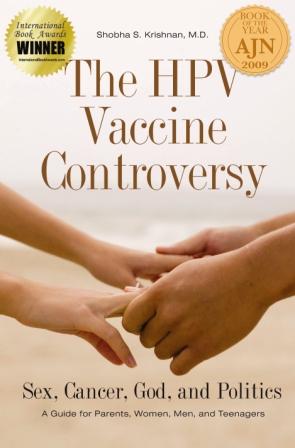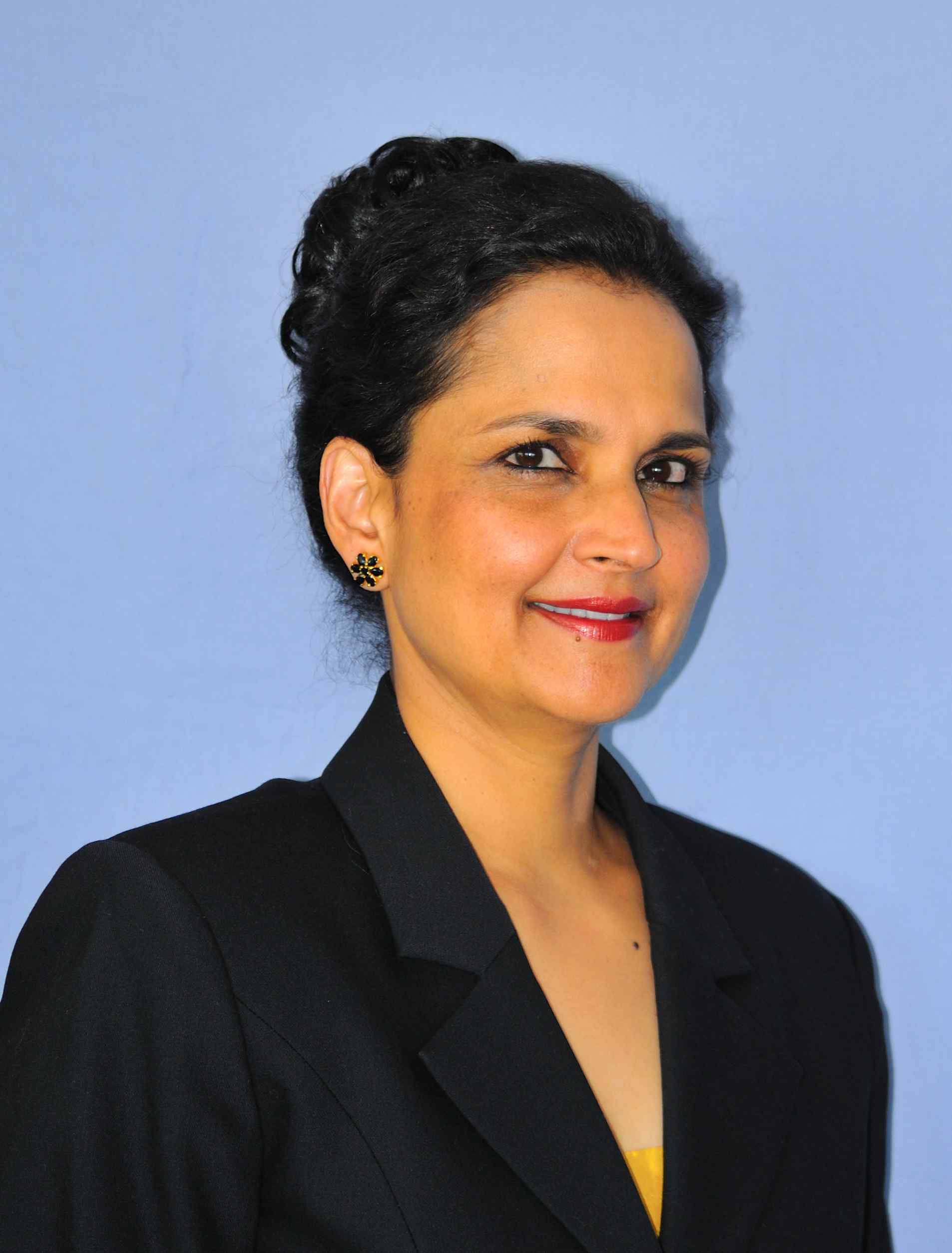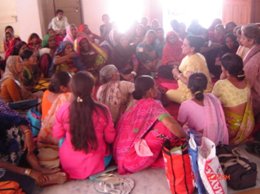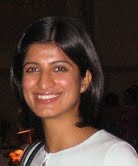
The HPV Vaccine Controversy | Shobha S Krishnan, MD
Home | About the Author | The Book | Reviews | Features | Global Initiative | Purchase | Contact | |

GLOBAL INITIATIVE AGAINST HPV AND CERVICAL CANCER (GIAHC)
An Internship, Research and Volunteer Program
The Global Initiative Against HPV and Cervical Cancer is the international arm of the NCCC, and will be launched in April 2010 by Dr. Krishnan, the Founder and President of the program. GIAHC serves as a platform to provide Global Coalition members (students, professionals, and volunteers alike) an opportunity to serve and collectively reduce the burden of HPV and cervical cancers around the world through advocacy, action, education and collaboration. Stay tuned for more details.
We believe that a woman is the nucleus of her family - when she becomes ill or dies, her children, family and community suffer. Our programs strive to minimize these far-reaching consequences through:
Building relationships to develop, strengthen and support HPV and cervical cancer prevention, screening and treatment programs: By making use of the knowledge and talents of local and international health and allied workers, we can link communities to health care programs that are locally available to provide HPV and cervical cancer prevention and treatment to under-served populations around the world. We aim to strengthen existing systems where available and support the development of new ones that are practical and can be integrated optimally where necessary. These comprehensive care services can be delivered to these populations year-round.
Promoting Heath Education: Through culturally sensitive and linguistically appropriate health eduction materials, we promote, prevent, and improve knowledge about HPV and cervical cancer.
Engaging communities to influence public health policy: We identify barriers and help communities implement creative, medically sound, economically sustainable, practical solutions for effective management of HPV and cervical cancers.
Mentoring and training GIAHC members: Via direct communication with the President and/or senior members at GIAHC, we offer a very personal and interactive environment for Global Coalition members to cultivate new possibilities for international cooperation and research.
Annual Conference: We provide opportunities for exchange of ideas and collaboration with experts in the field and explore possibilities for expansion of this program around the world.
Global Coalition Institute: Using education as the key component, we guide Global Coalition members to transcend boundaries and invest with health care workers globally to raise visibility, foster collaboration and develop initiatives to reduce the burden of HPV and cervical cancer in the countries where they work.
Community Coalition Program: Administered by NCCC, we train and empower our Chapter members in the U.S. to connect individuals and communities to various institutions and organizations that offer free or affordable care to reduce the burden from cervical cancer and other HPV related diseases.
There are several ways in which you can help. The details will be forthcoming in the next few weeks . Our main focus is volunteering abroad.
Volunteer Abroad:Through our international work, we offer our members a unique window to
the world.
All volunteers participating in GIAHC international programs are Global
Coalition members. GIAHC programs channel your creativity, ideas, and energy to develop real and
meaningful change through personal involvement.
Our volunteer program is unique in that we hand pick our candidates,
listen to their goals and match them to our programs in areas of mutual
interest. In addition, we guide them through their research projects
where applicable and help them shape their initiatives. Candidates will
have ample opportunities to continually interact with key Global
Coalition members at GIAHC. We also encourage our members to discuss
their plans with their professors or advisors at their respective
academic institutions so that we can coordinate our efforts to create
the best experience possible. These memories will last a lifetime!
Overview: Distinction is made between internship, research and volunteer assignments. Global Coalition members interact with local doctors, nurses, public health and community health workers to facilitate comprehensive HPV and cervical cancer prevention care for patients who need it the most.
Three primary types of opportunities are available:
Work experience internship: Global Coalition members 18 years and older are eligible. Those
between the ages of 15-17 may participate if accompanied by a parent
who is also a Global Coalition member.
Work experience internships provide invaluable experience for participatings and provides a definitive edge when applying for jobs
or universities at the end of the course.
Global Coalition interns are encouraged to apply their global health
delivery skills and join a movement of global leaders committed to
developing effective programs for HPV and cervical cancer preventive
programs. All interns will receive a certificate from GIAHC on
successful completion of their program.
Research opportunities: These are available to undergraduates (through a
selection process), graduates, post-graduates and faculty members of academic institutions.
These opportunities are contingent upon approval of the Internal
Review Board (IRB) at the candidate's respective institutions and at the
discretion of GIAHC and local health authorities in the various countries
Voluntary assignments: GIAHC helps Global Coalition members join our
local partners and help strengthen their presence in local communities
by sharing their skills and experiences. Volunteers gain a comprehensive
understanding about the opportunities and challenges of global health.
This type of humanitarian effort gives volunteers the opportunity to be
a part of making change without making substantial sacrifices on their
professional and personal fronts.
1. KMVS/Bhojay Project:
Kutch Mahila Vikas
Sangathan (KMVS) is a grassroots collective of rural women in the Kutch
district of Gujarat, India. Since its inception in 1988, KMVS has grown
from a three-person venture into a dynamic organization of more than 70
staff members and 13,500 rural women who have been organized into
collectives throughout 4 Talukas (blocks) - Pachcham, Nakhatrana, Abdasa,
and Mundra - spanning over 150 villages. As a local federation of rural
women, KMVS has heralded a movement of social change by addressing
critical issues that touch the every-day lives and livelihoods of rural
women and their larger communities. The primary goal of KMVS is
empowerment of women through interventions which address the issues
concerning their lives. In order to realize these goals, KMVS has been
organizing and mobilizing women into local collectives capable of
independently addressing the issues of gender inequities in the
development process and engendering a sustainable socio-economic transformation in the region.
In the spring of 2009, HRIDay began work on a Cervical Cancer Screening and Awareness project in partnership with Bhojay Sarvoday Trust. Nearly half a million women are newly affected by cervical cancer each year. The majority of these women live in developing countries, including more than 100,000 in India alone. In developed countries, the incidence and mortality rates of cervical cancer have gradually decreased, thanks largely to screening programs. In developing countries, however, most women do not have access to effective early detection and treatment programs that can halt or slow the progression of the disease. Although 80% of cervical cancer deaths currently occur in developing countries, a screening and vaccination program can change this trend.
The idea for the Cervical Screening program started when Dr. Shobha Krishnan, a gynecologist working in New York, visited KMVS and the Bhojay Sarvoday Hospital to discuss simple and cost effective methods to diagnose cervical cancer in rural and low resource settings that do not require a laboratory. Motivated by the high prevalence of cervical cancer in India, Dr. Krishnan's advice, and the success of their past collaboration, KMVS and Bhojay Sarvoday Trust are again working together. Their goal is to raise awareness about HPV and cervical cancer and to lower rates of cervical cancer by getting women tested and treated. KMVS will use its skills and experience working with women in the area to organize education and training and raise awareness about this issue on the grassroots level. KMVS staff will assist the health workers from Bhojay to conduct the mass cervical screening. Women identified at these camps as potentially having cancer are referred to Bhojay Sarvoday Trust Hospital for treatment. About Bhojay Trust Hospital:
Bhojay hospital is a trust hospital mainly funded by Jain communities originally from Bhojay that are invested in development work in the region. Most of the work at Bhojay involves gynecology camps and ophthalmology camps. Camps are conducted every two to three months.
Between 30 and 50 gynecological surgeries are performed over a two day period. Patients are all gathered at the hospital on a particular day, and surgeons travel from Mumbai and offer their services free of charge. There is no cost to the patients for the surgeries. All activities of the hospital and run by Mr. Liladhar Gada, a former businessman from Mumbai who now dedicates all his time and energy towards development projects in Bhojay.
With regards to cervical cancer screening, so far, six pairs - each composed of one Health Worker and one dai- have been trained at the Tata Cancer Memorial Institute in Mumbai to educate and conduct mass screenings. The model currently being tried is for each pair to train four more pairs of Health Workers and dais from neighboring villages. In this fashion, Health Teams will spread into new districts, and several villages will be covered.
Future strategies for program design to overcome challenges and improve lives and learning include initiating clinical research programs and assessing cost, accessibility and education aspects of the project. In addition, documentaries, puppet shows, and male health educators will be involved to help increase knowledge about HPV and HPV prevention in the rural populace.
Research has shown that educating men and seeking their support will improve the rates of women getting screened and treated for cervical cancer. In addition, men can also develop HPV related diseases and in turn transmit the virus to their female partners, causing diseases in them. Therefore, it is GIAHC's vision to include men as full partners in the education, advocacy and developmental strategies for prevention and effective control of the spread of HPV. The elusive male factor has to be addressed and emphasis should be placed on men as sexual partners, husbands and fathers if we are to reduce the viral load in this society, says Dr. Krishnan.
Deepam Cancer Screening Project for Women (DCSPW):
Deepam Cancer Screening Program for Women (DCSPW)is a novel initiative by Deepam Meditrust, the non-profit wing of Deepam Hospitals limited Chennai India. The vision of DCSPW is to screen at least 200,000 women in two years for cervical and breast cancer and provide them with treatment.
Deepam Hospitals: A chain of multispecialty hospitals located in South Chennai with 5 Centers. These hospitals have a reputation of providing high quality and low cost treatments to the population of South Chennai for more than two decades.
Deepam Meditrust: This is the non-profit wing of Deepam Hospitals that focuses on Community Outreach Programs, Awareness Creation Programs, Educational and Training programs. The noble aim of the trust is that “no one should be refused treatment because of their inability to pay.
Equitas: Equitas is one of India's fastest growing microfinance organizations and has given small loans to more than 700,000 poor women in Chennai. Most of these women do not have access to any kind of medical care and Deepam Meditrust has partnered with Equitas in taking care of health screening of these women and particularly in cancer diagnosis and treatment.
DCSPW: This project was launched in December 2008 and through this initiative around 300 women are screened for cervical and breast cancer and advised about general health care every week. Those women diagnosed with cancer are then being provided free and subsidized low cost treatments at Deepam Hospitals.
Opportunities: Opportunities are available to university students, academic institutions and clinicians based upon interests and qualifications to formulate research projects, assist in community outreach, and participate in diagnostic techniques and treatment for HPV and cervical cancer. The numbers of women who have to be screened are so huge that this program has the potential to become the largest cancer screening program in the world. More funds and human resources are necessary to make DCSPW a successful program on a larger scale.
TESTIMONIALS:
Surbhi Grover: Harvard Medical School - Winter 2010:
"I found out about Dr. Krishnan and her work at Bhojay through some of my other mentors in public health. Right away, I was really impressed with her passion and commitment and knew that we would work well together. As we planned the next steps of the project, she was incredibly supportive and did her best to nurture my interests. Through her support and the generosity of my residency program, I was able to spend a month at Bhojay during my internship to build on my research in the area. I returned wanting more and committed to spending my research time during residency in India building this program further and designing research to support cervical cancer screening efforts in India. I am really grateful to Dr. Krishnan for opening me to this experience and being very patient and supportive as I find my direction in this field."
Bio: Dr. Surbhi Grover is currently a Radiation Oncology resident at Hospital of University of Pennsylvania. She received her MD from Harvard Medical School and her BA in Economics from Columbia University. During medical school she worked under Prof. Jeffrey Sachs and other economists at the Earth Institute on evaluation of the National Rural Health Mission, a rural health initiative by the Ministry of Health of India. Her interests lie in oncology and public health, specifically women's health and cervical and breast cancer screening and awareness program implementation and upscaling. She hopes to continue to contribute towards cancer prevention efforts in India through her residency and beyond.
Alice Drain: Yale College - Summer 2009:
"I initially contacted Dr. Krishnan after a history professor at Yale told me about her public health work. Dr. Krishnan kindly put me in contact with the women of Kutch Mahila Vikas Sangatan, which she had visited earlier in the year to discuss starting a grassroots program to screen for cervical cancer. I was encouraged by their enthusiasm and long record of community involvement. I volunteered as the summer health intern for KMVS in the summer of 2009 working to launch a cervical and breast screening program. For the first half of the summer I was based primarily in the KMVS office in Bhuj, though I visited Bhojay Sarvoday Hospital during one of their quarterly gynecological camps, where I was invited into the OR to view surgeries and to two villages for field group discussions. I lived a ten-minute walk away from the office in a modest guest room and worked Monday through Saturday to produce materials for the education campaign, research cervical cancer testing and vaccination strategies, organize field visits and document the program. In Bhuj I dressed in clothes from the local bazaar, met other foreigners volunteering through different organizations, celebrated at a wedding, and enjoyed mango season and Indian snacks with my coworkers with great pleasure. Later in the summer I travelled with a dozen women for a two-week training program at Tata Memorial Hospital in Mumbai and then helped with two pre-camp education visits to launch the cervical cancer screening camps. Throughout the entire experience, Dr. Krishnan’s encouragement and support was invaluable. I updated her on progress in Bhuj, and her counsel and presence was crucial in keeping the momentum of the program going. Because I did not speak Hindi or Gujarati, I appreciated having someone I could turn to with nuanced questions or when I needed comforting after my computer crashed!"
Bio: Alice Drain is a senior at Yale University majoring in history. She is involved in community service and currently serves as the Education Network Coordinator for Dwight Hall, the independent center for public service and social justice at Yale, and as a volunteer at The Connecticut Hospice. A course on public health convinced Alice to make the transition to medicine, and she plans on enrolling in a post-baccalaureate program after obtaining her B.A.
THE PLAYERS:

Dr. Shobha Krishnan, discussing HPV, cervical cancer
and screening techniques with women at KMVS in winter of 2008.
Liladhar
Gada
is a trustee of
Shri Bhojay Sarvoday Trust. Bhojay emerged in
1996 with the objective to provide the basic health facilities to the
dispossessed of rural Kutch, especially in remote areas where the number
of deaths due to lack of medical facilities or treatment were on the
rise. Kutch comprises of 10 blocks (Talukas) with 875 villages. Bhojay
itself is located 40 kms. from Mandvi and opened in 1998. The hospital
caters to the medical needs of the rural population from West Mandvi,
Abdasa and Lakhpat blocks and has collaborated with KMVS in the past
to provide women suffering from problems related
to reproductive organs access to medical services, arrange quarterly
surgical camps, train Dais and health workers and undertake an education
and awareness program focused on women’s reproductive health.
Alka
Jani
was one of the founding members of KMVS in
1989 and has been
extensively organizing, mobilizing, and training rural women in poverty
since then,
serving as Executive Secretary of KMVS for several years. She currently
directs the HRIDay Cell and focuses on health,
capacity-building and leadership training.
In 2005 she was one of the 1000 women nominated for the Nobel Peace
Prize and awarded the GramVikas Paritoshik in 2004. She holds a Masters
in Commerce.
Tarnistha
Ray
worked in the field of health as a district NGO coordinator in the field
of Mother NGO Project Phase II and spent two years working on education
for disabled children. Currently she is working as KMVS Secretariat
Program Coordinator and thereby supporting health activities of KMVS.
Tarnistha received a Masters in Social Work in 2003.
Damyantiben
Joshi has worked with the KMVS for the past 10 years in the
mobilizing and organizing of rural women. In addition, she supports the
women’s other needs and assists HRIDAY cell in various health based
training.
Bharti
Khodiiyar
has worked as a Health trainer in both general and reproductive health
with KMVS for the last 3 years. She holds a
nursing degree and specializies in Maternity, child care
and working as Main Health Trainer. In addition, she has taken
certificate courses in Food and Nutrition and child development and
holds a M.A. in Sociology.
Alice
Drain is a senior at Yale
University majoring in history. She is involved in community service and
currently serves as the Education Network Coordinator for Dwight Hall,
the independent center for public service and social justice at Yale,
and as a volunteer at The Connecticut Hospice. A course on public health
convinced Alice to make the transition to medicine, and she plans on
enrolling in a post-baccalaureate program after obtaining her B.A. Alice
traveled to the Kutch area in the summer of 2009 and worked with Dr.
Krishnan and KMVS/ Bhojay Trust to launch the Cervical Cancer Awareness
and Screening Project.
 Surbhi
Grover
is a Radiation Oncology resident at Hospital of University of
Pennsylvania. She received her MD from Harvard Medical School and her BA in
Economics from Columbia University. During medical school she worked under
Professor Jeffrey Sachs and other economist at the Earth Institute on
evaluation of the National Rural Health Mission, a rural health initiative
by the Ministry of Health of India. Her interest in onocolgy and public
health and well suited for her passion for women's health and more
specifically cervical and breast cancer screening and awareness program
implementation and upscaling. She hopes to continue to contribute
towards cancer prevention efforts in India through her residency and beyond.
Surbhi
Grover
is a Radiation Oncology resident at Hospital of University of
Pennsylvania. She received her MD from Harvard Medical School and her BA in
Economics from Columbia University. During medical school she worked under
Professor Jeffrey Sachs and other economist at the Earth Institute on
evaluation of the National Rural Health Mission, a rural health initiative
by the Ministry of Health of India. Her interest in onocolgy and public
health and well suited for her passion for women's health and more
specifically cervical and breast cancer screening and awareness program
implementation and upscaling. She hopes to continue to contribute
towards cancer prevention efforts in India through her residency and beyond.